Items
Subject is exactly
Agriculture
-
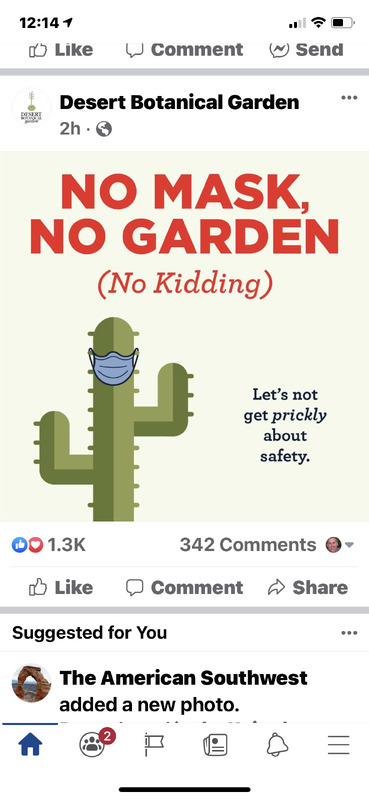 2021-03-12
2021-03-12No Mask, No Garden
The Desert Botanical Garden is a fixture of Phoenix area tourism. A botanical garden of arid lands, it's unique and draws thousands of visitors every year. Their social media emphasized the importance of masking during the pandemic, with the catchy phrase "Let's not get prickly about safety." -
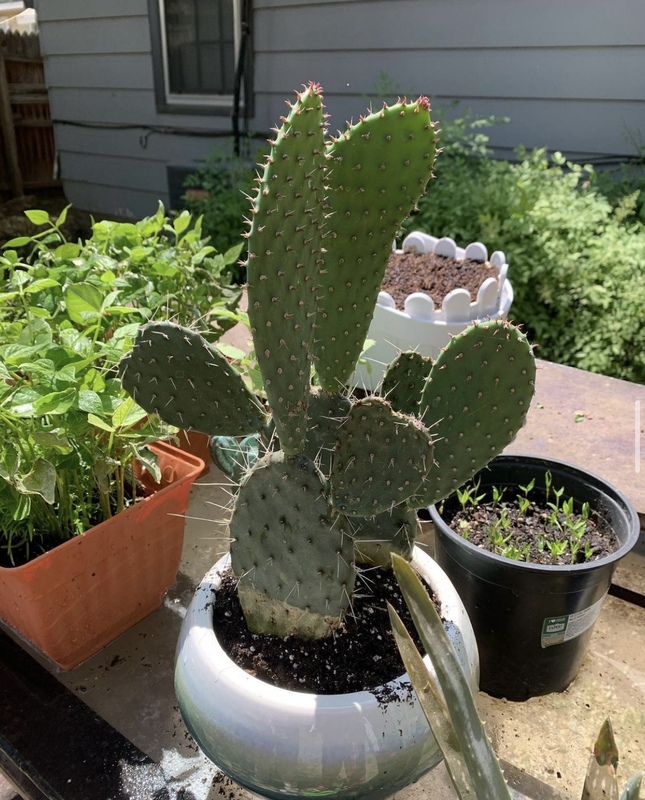 2020-07-21
2020-07-21I think I want to start a garden with you
I decided to start a garden during the pandemic with my girlfriend at the time (now wife). It was my senior year of college and life changed drastically in the spring when the pandemic hit. My wife and I had somewhat recently started dating at this point and suddenly we had to go on lockdown together to avoid any potential spread to her family since we both were required to go in person for our jobs. We went from dating to living together in an instant and it made us grow even closer. Together we tried to find quarantine hobbies to bide our time originally thinking that quarantine would only last a few months. I remember one day suggesting we start a garden in the backyard. My yard in Lubbock got so much sun it was just perfect for a garden. We slowly built a garden adding various plants from cactus and aloe vera to hot peppers, bean sprouts, and sunflowers. I loved going out there and caring for all the plants with my wife it was a real bonding experience. It was beautiful watching the whole process of our plants transform from little seeds to baby sprouts. I remember the way the new sprouts smelled crisp as they became verdant green and leafy. When we would water them on a particularly hot day it had a scent that reminded me of rainy summer days in Dallas when it got humid. I enjoyed getting to start this hobby that I most likely wouldn't have picked up at the time if I kept to my usual college routine. It was also a good distraction for both of us from the worries and anxieties of the pandemic. -
 2022-08-22
2022-08-22Sensory Roadblock: Unexpected Detriments and Benefits of Mask-wearing in Gathering Food and Information
During the pandemic, I opted to order all of my groceries online to be delivered. I have never been much of a take-out person and mostly cook at home, so I really love to pick my ingredients when grocery shopping. Missing the in-store grocery shopping experience over the past few years, I sometimes go out to gather my fresh foods, especially after the normalizing of social distancing and mask regulations. Though I still prefer to wear a mask, even when regulations are occasionally loosened, a sensory occurrence that I did not expect to miss or lack as a consequence of mask-wearing is the importance of smell in my food-gathering habits. Being able to check the ingredients for both flavor and freshness qualities by smelling them is such a natural instinct that most lifeforms use to find their food. I never considered myself someone who actively smells things very often, so this sensory roadblock surprised me, as I initially chose to go to the store to get better foods than those that had been delivered to me. I have often come home and found that the asparagus or meat that I had just bought had that unpleasant odor of food past its prime, even though its appearance and texture seemed just perfect. I also miss being able to smell the full intensity of the fresh-cut flower bouquets that proclaim the seasons when going out grocery shopping. This temporary lessening of sense-of-smell from wearing a mask has been a bit of a hinderance in such ways, but it has been beneficial in many others. For example, I have dust allergies and used to become very stuffy after visiting my library due to the book dust—especially since, as a history and art history graduate student, all the books that I want or need to check out are usually the oldest or dustiest ones! Not being able to smell or breathe-in these things has helped me dramatically in my experience of information gathering. I can now spend hours looking over books that I wouldn’t have thought of opening before and have found some wonderful sources for my research. Though of course many historical texts are fully available in online formats and an invaluable resource, I often feel the same way about visiting my library as I do visiting my grocery store—I hope to find something myself that might work even better for my own project, either culinarily or academically. -
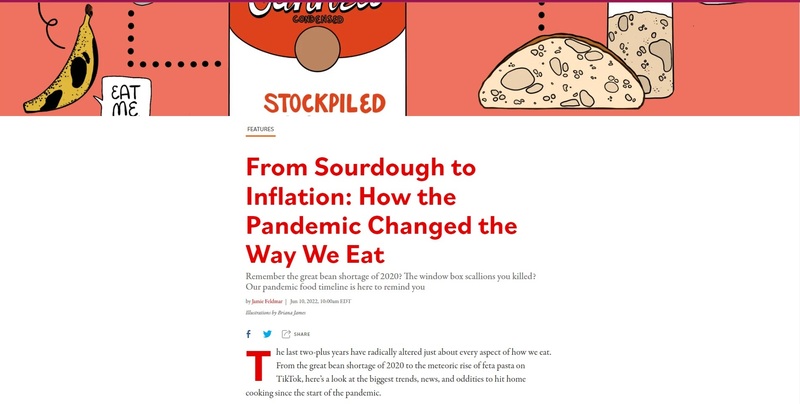 2022-06-10
2022-06-10From Sourdough to Inflation: How the Pandemic Changed the Way We Eat
This is a news story from Eater by Jamie Feldmar. This chronicles the changing food habits of people throughout the pandemic. In 2020, there was a wave of panic buying for things like flour, canned soups, and frozen vegetables. The use of grocery store delivery apps also increased that year. Instacart, a grocery delivery app, saw a 229% sales increase. With the panic buying came people looking for ways to use up things like canned goods and dried pasta. Things like sheet pan dinners, salads, and other easy meals became sought after in that time. Another change that occurred was people trying food trends popular during the pandemic. Things such as sourdough and whipped coffee were major food trends of that time. Meal kit delivery rose during the pandemic. Blue Apron had subscriptions to their food service skyrocket. Hello Fresh did as well, and was forced to close down temporarily to hire 3,000 extra workers to tackle the rising demand. In 2021, other food trends occurred while many restaurants and other dining establishments could not operate at full capacity. Things like espresso martinis and the dalgona candy, and candy made popular by the TV show Squid Game, were just some of those food trends. The food trends were not without labor issues though. In October 2021, Kellogg's workers went on strike, which affected the supply chains of that brand. Supply chain issues have become an ongoing problem since the beginning of the pandemic. In February 2022, the US temporarily shut down avocado imports from Mexico, making the food more expensive. With supply chain issues comes rising inflation. According to the USDA, food prices in 2022 were expected to rise between 6.5% to 7.5% increases. The Russian war with Ukraine cited as one of those causes. May 2022 saw a baby formula shortage, where 40% of baby formula was out of stock. Today, the USDA is looking to learn from the pandemic and the food issues that are occurring. One way they are doing this is through "a framework to transform the food system," which has the focus on building a more resilient supply chain while providing for rural and underserved communities. My own prediction is that the supply chain issues will mean more local food and less imported food overall in the United States. This means opening more food processing plants and increasing work domestically within the food industry to meet demands. The global food system is very fragile to things like pandemics and war. If food prices are to ever get lowered as well, it is important that more food gets produced and used locally. It would have the added benefit of being more environmentally friendly too, as the food would not have to be shipped as far away to where it gets used. -
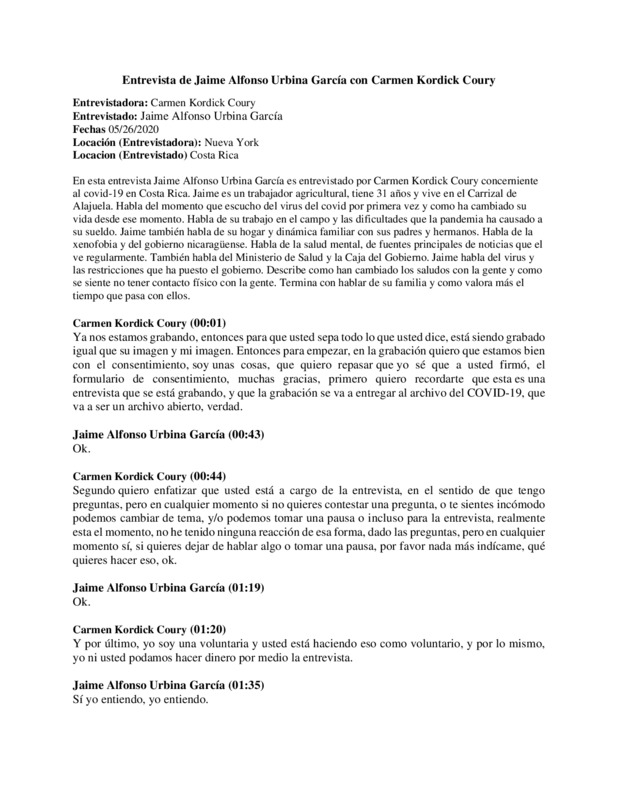 05/26/2020
05/26/2020Jaime Alfonso Urbina García Oral History, 2020/05/26
En esta entrevista Jaime Alfonso Urbina García es entrevistado por Carmen Kordick Coury concerniente al covid-19 en Costa Rica. Jaime es un trabajador agricultural, tiene 31 años y vive en el Carrizal de Alajuela. Habla del momento que escucho del virus del covid por primera vez y como ha cambiado su vida desde ese momento. Habla de su trabajo en el campo y las dificultades que la pandemia ha causado a su sueldo. Jaime también habla de su hogar y dinámica familiar con sus padres y hermanos. Habla de la xenofobia y del gobierno nicaragüense. Habla de la salud mental, de fuentes principales de noticias que el ve regularmente. También habla del Ministerio de Salud y la Caja del Gobierno. Jaime habla del virus y las restricciones que ha puesto el gobierno. Describe como han cambiado los saludos con la gente y como se siente no tener contacto físico con la gente. Termina con hablar de su familia y como valora más el tiempo que pasa con ellos. -
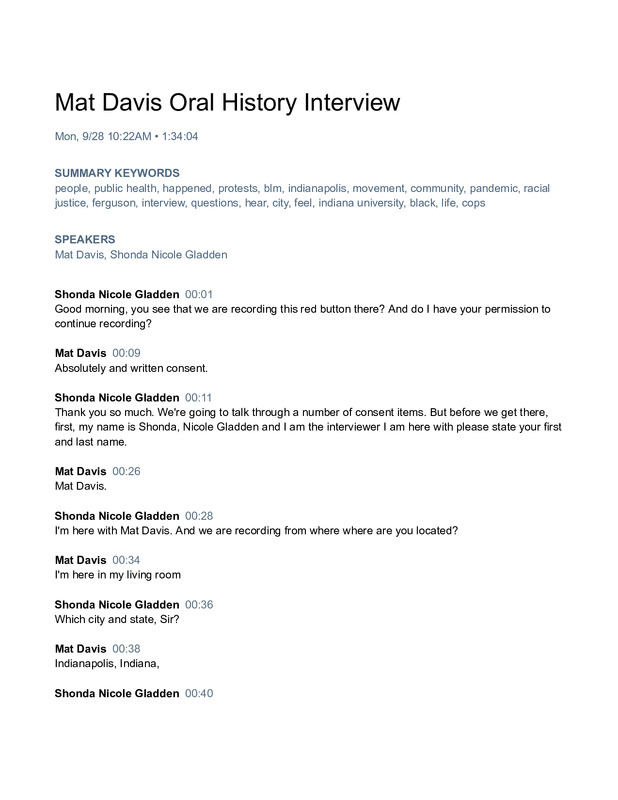 09/25/2020
09/25/2020Mat Davis Oral History, 2020/09/25
C19OH -
2020-03-21
Gardening During the Apocalypse
I can't think of the beginning of the COVID-19 pandemic, the shut downs and lock-ins, the stay-at-home orders without thinking of my brief foray into gardening. My husband and I bought our house in northwest Baltimore in April 2019. Our little duplex sits near the end of an unbelievably picturesque street in a fairly affluent neighborhood known for its garden communities and HOA-hosted wine and cheese parties you have to pay to attend. The neighborhood is surrounded by much poorer neighborhoods and heavily-trafficked streets, the direct product of red-lining in Old Baltimore. While the Original Northwood neighborhood is much more diverse - demographically and economically - than it was when it was first established in the 1930s and 1940s, my husband and I, as some of the only residents under 40, still felt like we didn't necessarily fit in with our older, more well-to-do neighbors, despite absolutely adoring our little home, which had been lovingly renovated and reimagined by its previous tenants. Come March 2020, however, the noise from the crowded streets, the surrounding neighborhoods, and from our own neighborhood, died down substantially. Our streets and its surrounds have always been a great place to go for a walk, but now every day people were strolling by in ones and twos, sometimes in small family units. Everyone needed to get out of the houses they were now cooped up in, and I was no exception. Much to my mother's chagrin - and likely to my neighbors' embarrassment - I did not inherent my mother's green thumb. Because I am a millennial I found an app that identifies plants and set about rooting out weeds, pruning the flowers the previous tenants had not intended for me to neglect, picking up the endless stream of leaves from our several 100+ year old trees, digging up more weeds and debating with my husband about whether we should start an herb and vegetable garden or put in a patio in the little garden area that connects our front and back yards. I did not become proficient at gardening. I am much better than I was, however, at identifying the truly astonishing diversity of plants in my own garden and in my neighborhood by scent and even touch. I learned that the dried and withered allium stalks pull effortlessly out of the ground after they die, that African violets also give way to a gentle scooping from the earth, and that thistle, of course, will still try to prick you as it attempts to cling to the soil. I learned that those thin but tough shoots of elm and oak born from the seeds and acorns the squirrels missed not only grow rapidly, but are extraordinarily difficult to rip from the earth. And no matter how much seemingly-delicate clover one claws at, its roots will always remain beneath the surface, as virulent in a day or two as when one earlier tore at it in complete dismay of its sheer stubbornness. I did not become proficient at gardening. But I did relish the feeling of cool, damp earth underneath my hands, even in my fingernails, the crunch of dry leaves, the slick sliding of wet leaves, the red, angry weals left on my hands from those stubborn oaks. I felt accomplished as I pulled lovely, but ultimately threatening African violets and wild raspberry from underneath the spreading cover of the hostas, and as I pulled wild mint, lemon, and rosemary for tea and cooking. I told myself I'd use the ramps (a species of wild onion that smells and tastes sort of of like a combination between garlic and scallions) in a soup, as a college roommate of mine had done, but I forgot to harvest them in time. From what I recall, summertime is best, particularly late summertime. The other thing I remember about this time spent in my garden, hands in the dirt, sweat on my brow, bug bites inflaming every available inch of skin, is the new sense of connection I felt with my neighbors who stopped to wave hello, nod and smile at my gardening efforts. Neighbors who I hadn't gotten to know before the pandemic which now prevented us, due to fear of contamination from contact with other people, from truly getting to know each other still. But somehow, the simple act of being out in my garden, doing this simple, repetitive toil, made me feel like I was participating in a ritual, an activity that linked me to the less unsavory past of the community, and to neighbors who otherwise might have remained alien in a plague environment that seemed to bring a new apocalypse with every week. -
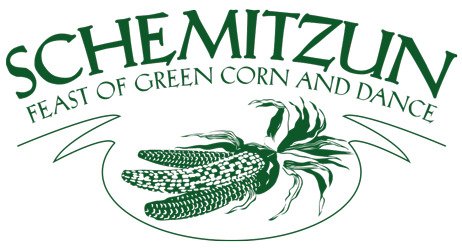 2021-08-28
2021-08-28Schemitzun
I attended an indigenous festival at the end of August 2021 called Schemitzun. Called the "Feast of Green Corn and Dance," the powwow took place on Mashantucket Pequot grounds and hosted various tribes competing in music and dance. My family and I attended as audience members and we were truly struck by the spirit of the event. The main announcer explained at various points during the festival that this year's powwow was very special, since Covid-19 had canceled the event the year before. He explained that events like Schemitzun keep the indigenous community connected and vibrant, and this year's event was meant to be a celebration of perseverance and survival. I found it incredibly powerful that indigenous communities continue to thrive and grow despite centuries of struggle, and managed to survive the Covid-19 pandemic on top of that. -
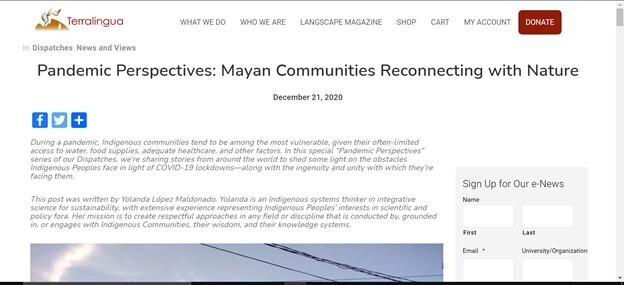 2020-12-21
2020-12-21Mayans and Covid-19
The topic of Language & Communication during the Covid-19 pandemic stood out to me because my father was from Guatemala, and I am of Mayan descent. I recently read an article from last year discussing the impact of Covid-19 on indigenous communities, especially the Mayans. The article mentions how certain problems were exacerbated by the pandemic: for example, the inability to effectively communicate the pandemic situation across many dialects. Despite a variety of struggles, the article highlights several benefits that Mayan communities experienced, including a renewed sense of community, culture, and farming. -
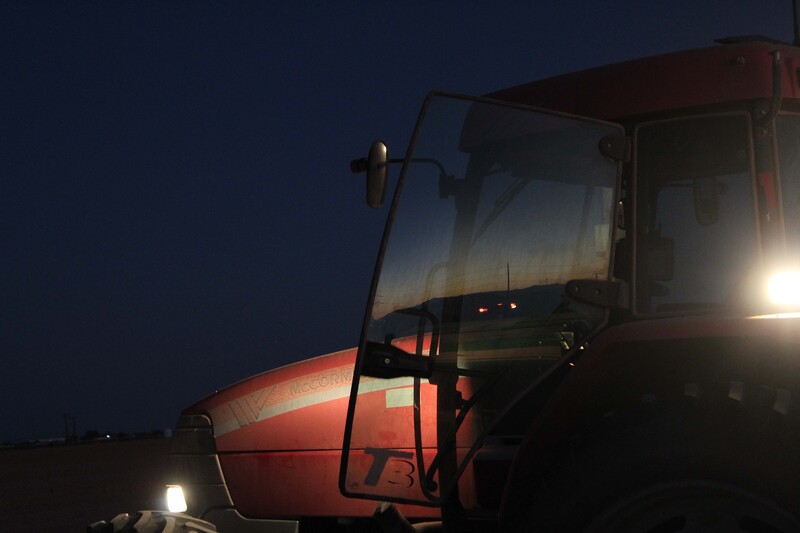 2020-10-28
2020-10-28The Minimum Wage Spotlight
The photographic story I've uploaded is about my [family member], Andres, who even with the pandemic at its worst peak, in 2020, had to continue in his job. He's an Arizona field laborer, a key worker for the farm he works in. The conditions are difficult, with a minimum wage that doesn't match the amount of work he does. As the photos indicate, his job can start at a very early time when the sun hasn't even risen. His job usually lasts 12 hours, so when it's the night shift, he doesn't come back till the morning hours. There are weeks when he has to stay inside a hot tractor for hours and there are other days when he has to do a lot of moving and carrying around. Due to the difficult weather Arizona may have, there’s a constant danger of heatstroke especially since a lot of his work includes physical labor. Looking deeper, these pictures of the work Andres does feels like a representation of the unequal power there is in the minimum wage system. Here we have a field laborer, who due to lack of education and financial resources growing up, wasn’t able to reach for higher positions that require degrees. He grew up in a poverty-stricken family and alongside being a Latino immigrant, opportunities were few and far between so in order to assure he keeps himself and his family fed and sheltered, so he’s forced to continue a job that doesn’t contain the best conditions or pay. This is only emphasized within the pandemic, minimum wage workers forced to continue working in bad conditions including the risk of getting sick because, in order to keep their head above water, they must. And yet, even with all the dangers and the long hours, their pay doesn’t reflect the job. This also connects to race, minorities most of the time stuck in these places due to the disadvantages they grew up with and continue to face. It’s the life of an individual who is input in a life in which already starts with less compared to privileged others, and then a pandemic hits which only emphasizes the disadvantages already there. Overall, the pandemic truly has put a spotlight on the many issues society already had. -
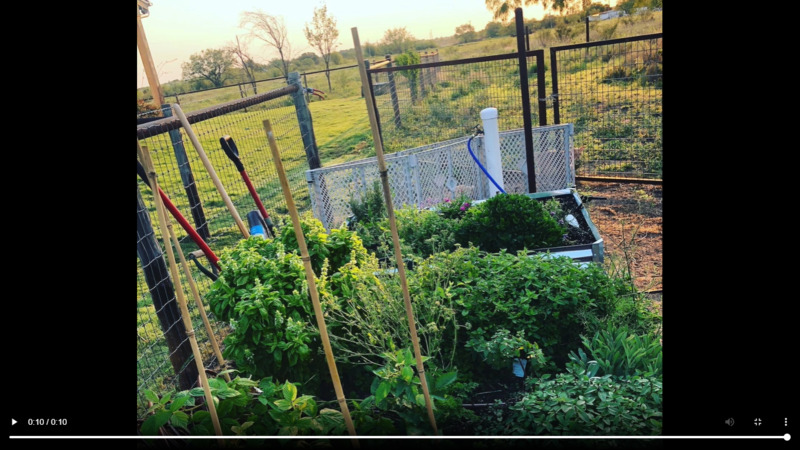 2021-08-06
2021-08-06Covid Gardening Story and Okra Recipe
I chose to focus on my garden and our chickens that we began right before the pandemic hit. I never realized how lucky I was to live in a rural environment until Spring 2020, when living in the country meant having a bit more freedom than in the city. Our garden and chickens provided us with foods that sometimes were out of stock in our small, local store. However, we also faced other things in our community that made the psychological aspects of the pandemic really hard, such as living with those who deny the reality of the disease and mitigation efforts that people like my husband promoted, as an ER physician. I suppose this story is a bit of a love letter to our little property out in the country, despite the differences in values that we have with our town. -
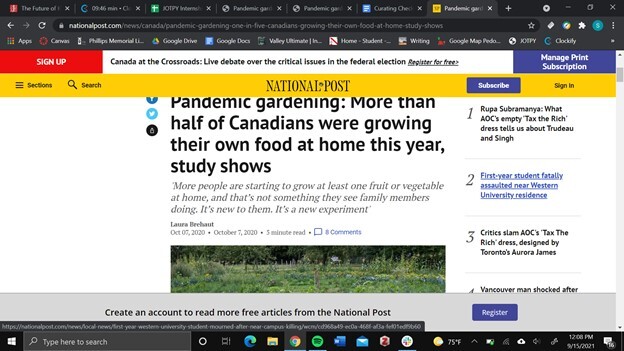 2020-10-07
2020-10-07Pandemic gardening: More than half of Canadians were growing their own food at home this year, study shows
Gardening and growing one's own food became more widespread during the pandemic, led by worries about food shortages and prices along with the desire to engage in new hobbies during the pandemic. This article discusses a study done by Dalhousie University regarding Canadians' growing their own food during the pandemic and compares the current gardening trend with the victory gardens prevalent during World War II. -
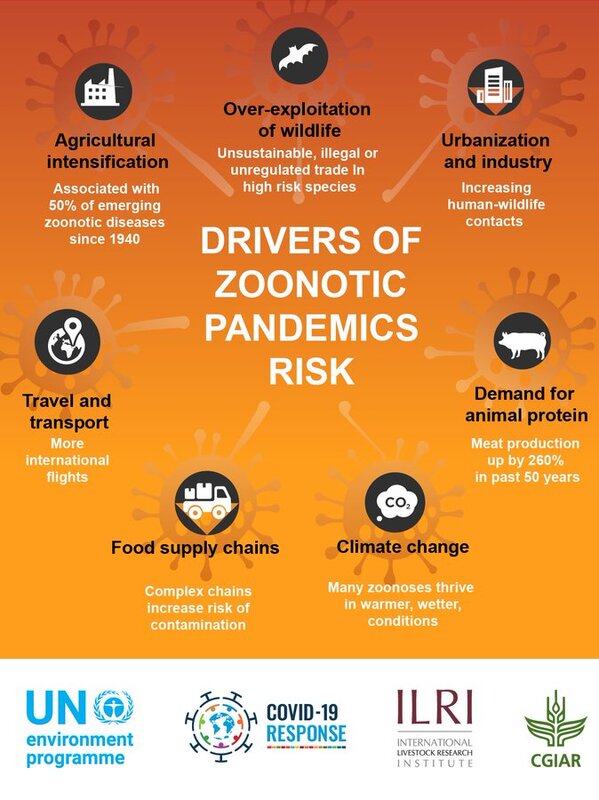 2021-07-06
2021-07-06World Zoonoses Day
This is a tweet from the UN Environment Programme showing the driving factors behind zoonotic diseases and pandemics. Humans abuse of the environment is to blame. -
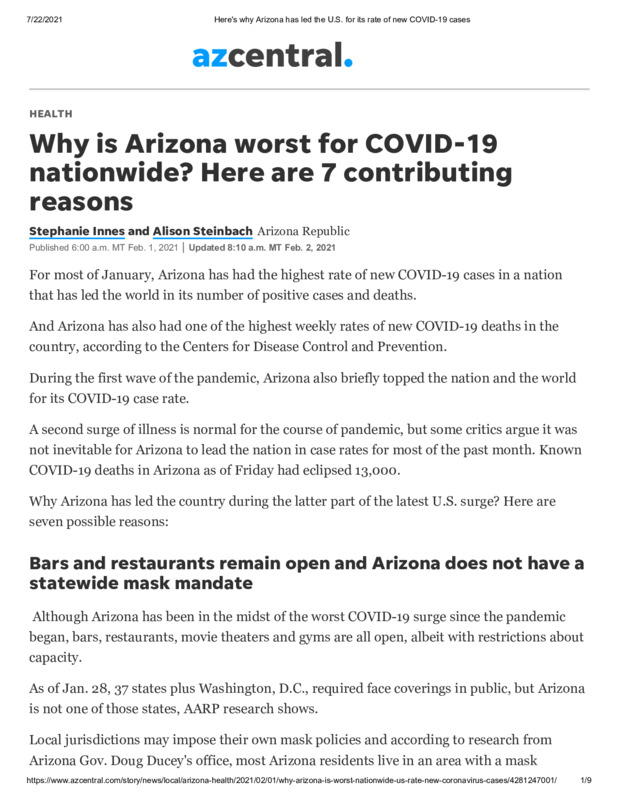 2021-02-01
2021-02-01Why is Arizona worst for COVID-19 nationwide? Here are 7 contributing reasons
This article discusses why Arizona's Covid rate was the highest in the country as of February 1, 2021. Contributing factors included a lack of mask-wearing and cross-border traffic. -
 2020-06-24
2020-06-24Rediscovering a Family Passion
In the pandemic, Kimry reached back to her roots and decided to create a garden. When asked by friends on Facebook what did she put into the ground to make it so fertile? She replied "I put love into my ground, I put hope into my ground, I put patience into my ground and I put heart and soul into my ground. In life you can try and put this into people and yield no love back, no real friendship, and no real kindness. But, I tell you, Mother Earth will show you, that you deserve all that you put into her and more. God's time can be so quiet, calming, and so peaceful." -
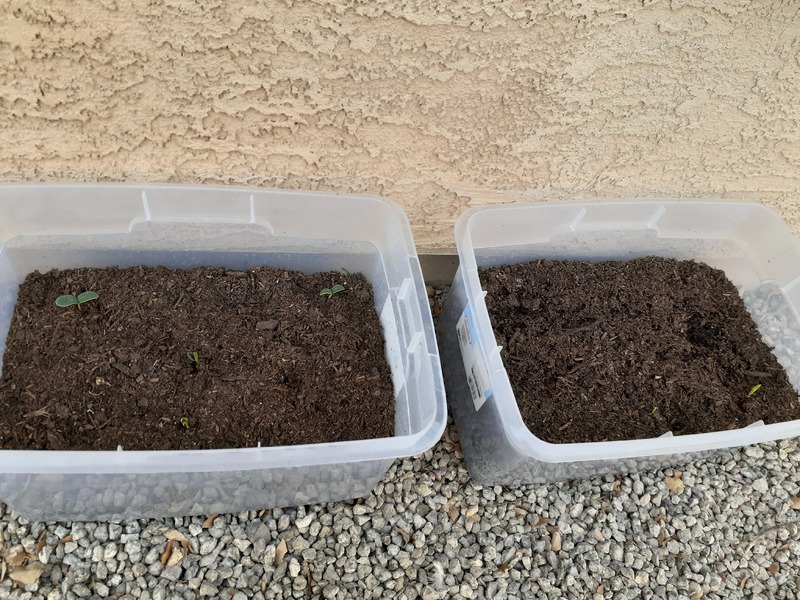 2021-04-15
2021-04-15Victory Garden
A photo of the garden I have started - the pandemic has given me more time at home to tend to something like a garden. -
 2020
2020Yanomami want miners out of their lands to prevent spread of COVID-19
"The most well-known Yanomami shaman and leader, Davi Kopenawa, with French anthropologist Bruce Albert. Inspired by his words and teaching, Ye'kwana Leadership Forum produced the film "The Shaman’s Message", to bring the #MinersOutCovidOut campaign to the world. The campaign calls for the immediate removal of illegal miners who are active in the Yanomami Territory, destroying the forest and rivers, bringing violence and now COVID-19 with them into the communities." -
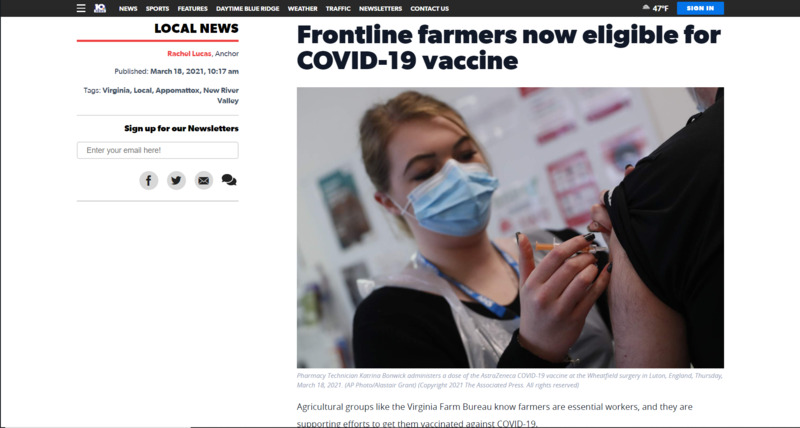 2021-03-18
2021-03-18Frontline farmers now eligible for COVID-19 vaccine
Agricultural workers in Virginia are now eligible to receive the COVID-19 vaccine. Although farm production hasn't dropped significantly due to COVID-19, many farmers are apart of high-risk categories. Giving farmers access to the vaccine is believed to ensure that the food supply is maintained. -
 2021-03-14
2021-03-14Ostara on a Budget
for Ostara this year, many of us will need to adjust our celebrations due to Covid-19. Many are feeling the loss of jobs, incomes, or stability this year. Lidia Pradas shares some inexpensive ideas to celebrate Ostara and welcome the new season. -
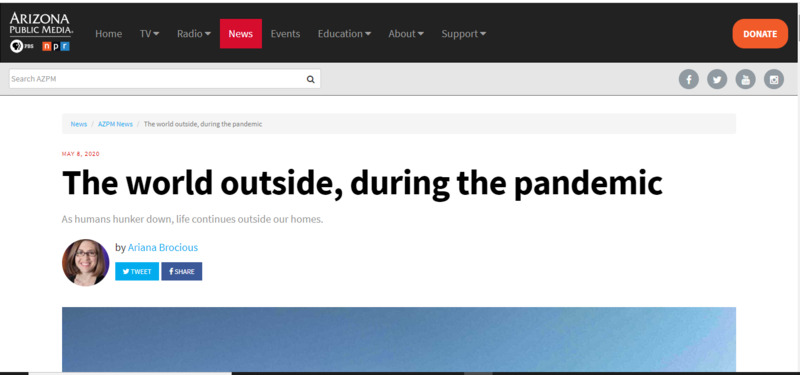 2020-05-08
2020-05-08The world outside, during the pandemic
The article describes how the pandemic has affected the natural environment in Arizona: the building of the border wall between the US and Mexico (with great effects on animals), the changes to how firefighters will put out fires during this time to adhere to social distancing guidelines, and the increase in trash in federal natural areas. It has described how some people have gained a new appreciation for the environment during these times. -
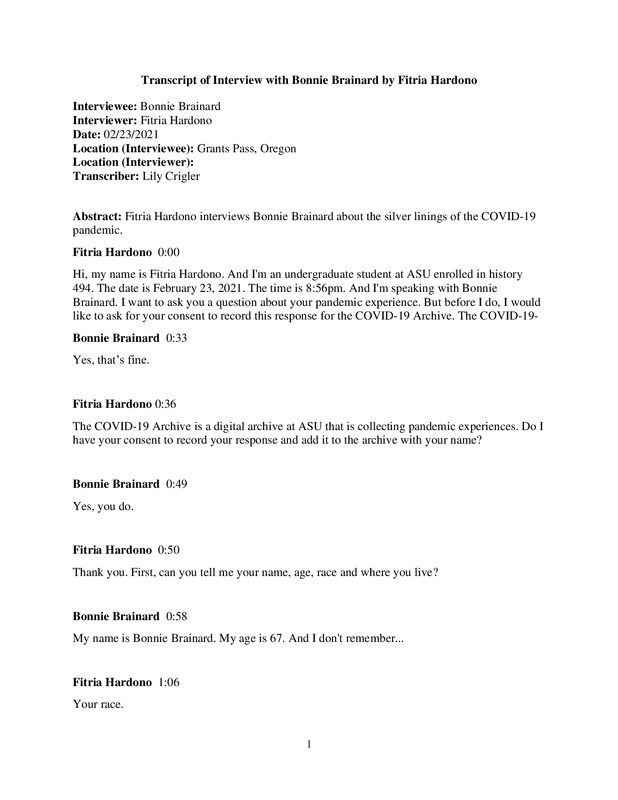 02/23/2021
02/23/2021Bonnie Brainard Oral History, 2021/02/23
I recorded a mini oral history with my former professor Dr. Beverly Van Note. -
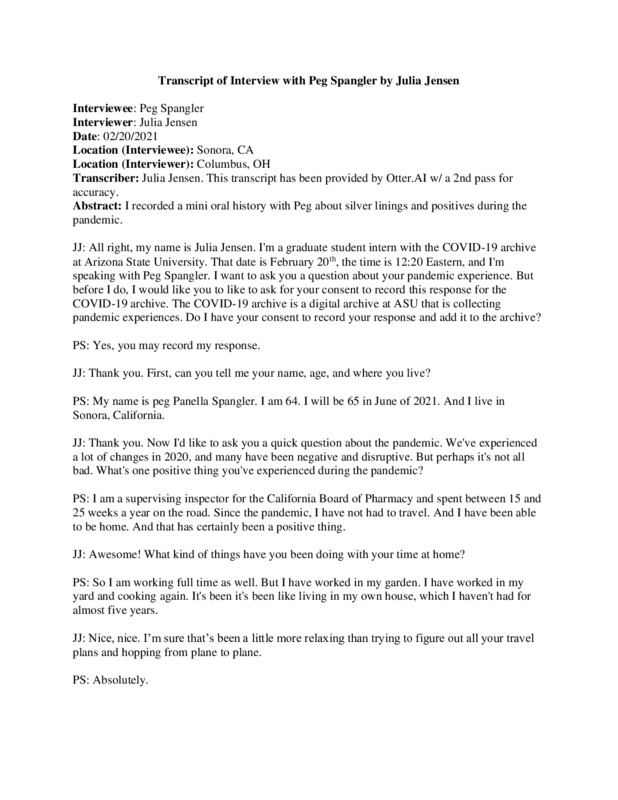 02/20/2021
02/20/2021Peg Spangler Oral History, 2021/02/20
I recorded a mini oral history with Peg about silver linings and positives during the pandemic. -
2020-02-05
Pandemic Brand Reviews: Sprouts Farmer's Market Grocery
There is a Sprout's less than 2 miles away from my house. My parents would often go to buy fresh produce and snacks from the bulk section. Due to the pandemic, Sprout's no longer offers their self serve bulk section. Instead, there are prefilled bags. My parents no longer frequent Sprout's, I think because of this new policy, or perhaps better prices elsewhere. Because my close friend works at Sprout's, I visit her at work. With the exception of the bulk section, everything is still the same. However, I do see the curbside pickup and grocery delivery options being used more. My local Sprouts has designated some parking spots for curbside pickup. One time when I was visiting my friend, she was on Instacart (grocery delivery) shopping duty that day. I walked around with her around the store as she picked up the items that the customer requested. She had to be very quick and find the items immediately. Not only that, but if the phone beeped, she had to drop everything she was doing to deliver a curbside order. Being an essential worker in customer service is very hard work. I hope that people can acknowledge and appreciate their hustle. -
 2021-01-14
2021-01-14The Silencing of Industry
The sensory experience that overwhelmed me the most as the United States, and the world, came to an abrupt halt when it was realized that we were in a pandemic virus outbreak was an aural experience—it was the overwhelming silence that came with the world stopping. I live in a heavy industrial town on the Pacific coast Of Washington. While I live about fifty miles from the cities and one hundred miles from Seattle the economy of this area is based around heavy industry and there is constant noise that comes with this. There is a port a mile from my house that is said to be the busiest deep-water port on the northwest coast. At this port soybeans, wheat, oil and lumber are shipped out and German cars built in Mexico are brought in, among other commodities. In my neighborhood there are four train tracks. The closest one is about five hundred feet from my house, the next three are another three hundred feet further. Those train tracks bring goods into the port like soybeans and wheat from the farm fields west of the Cascade mountains and fuel and oil for the ships and for the operations at the port. The train tracks also ship out the cars that come in from Mexico to car dealerships throughout the Northwest. Across from the four train tracks there are lumber mills. The lumber mills load up chip trucks (trucks that carry sawdust from the sawmills to paper mills) and the chip trucks roll in and out of town on a constant basis. The log trucks also roll through town on a constant basis and the log truck drivers as well as chip truck drivers live in the area and park their trucks at their houses. All of this leads to a very noisy area for such a small population. This has never bothered me as the only thing that I really miss about living in cities is the noise. This is the reason why the first thing I noticed as the Covid-19 shut down occurred was how much silence there was. No longer were there log trucks and chip trucks rolling through town. No longer was the rumbling and squelch of the train heard in the early morning and the late afternoon throughout the town. No longer were the airhorns and warning sirens heard from the port. It was just pure silence. -
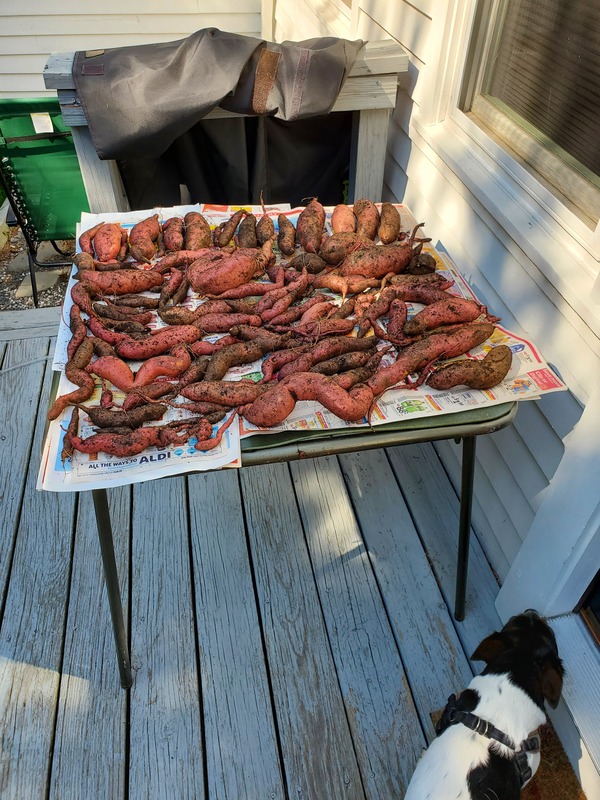 2021-01-13
2021-01-13Pandemic Hacks
At the beginning of the pandemic, it seemed for a bit of time that the infrastructure of the world was on shakey ground. Thankfully, our food supplies and economy did not collapse. However, the experience and extra-time during the pandemic led to me trying to become more self-sufficient in my livelihood. I have had a vegetable garden for years, but I started to grow different things this year than before. The picture above was my sweet potato harvest experiment, which I was pleased with and had a good amount of nutritious sweet potatoes. I had similar results with things like beans and regular potatoes (very nutritious and filling). On top of these things, I also tried to learn how to make products that I used regularly (even if these were more luxury items than necessities). Growing various herbs and spices, I began to make my own salad dressings, marinades, sauces, and pestos. Additionally, as a fan of craft beer, I enjoy drinking new and exciting beers but do not enjoy paying premium prices. During the lock down, I learned how to brew my own delicious beer for less than half of the cost from the store. All of these projects were fun to do, diminished boredom, and are skills which I can use to enrich my life moving forward. -
2020-01-12
What do I think is the cause of the Corona Virus?
Pretty much in this time we know that Covid was started in China. At this time Global tensions are pretty high with the Trump and Biden Administration and voting in America. With the tensions so high you could argue with the Chinese making a deadly virus and sending it to us, I don' believe that as if they did it would most likely be more deadly. I think that they had a problem with some agricultural farming and made a virus that infected a lot of people, them trying to hide it only escalated it into building up into infecting the entire world. Just the amount of things going between china and the world just escalated the cases. These are all just theories, the CDC hasn't created a cause for Covid yet, but I think it will happen sooner than later. Those are my thoughts today about how it was created, but tomorrow might bring new information, we will see. -
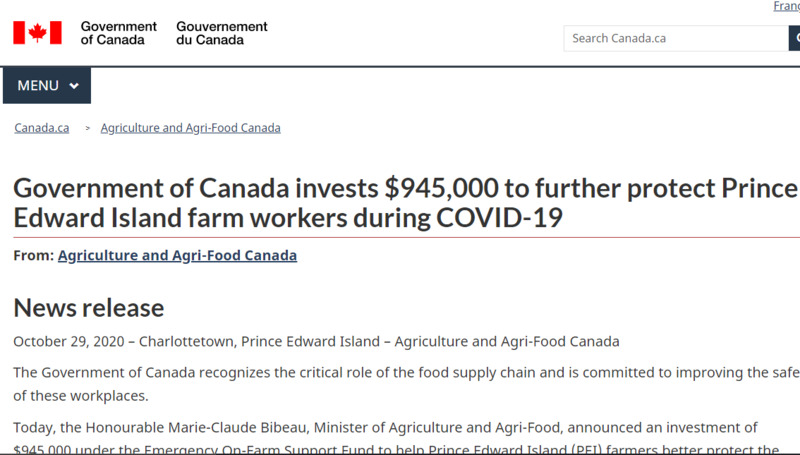 2020-10-29
2020-10-29Government of Canada invests $945,000 to further protect Prince Edward Island (PEI) farm workers during COVID-19
In this statement, the Canadian federal government pledges monetary relief to P.E.I.'s farmers amidst the pandemic. -
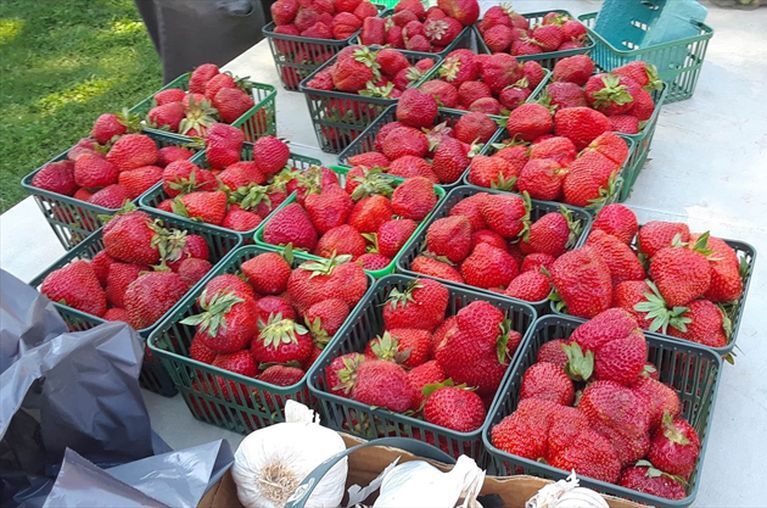 2020-06-02
2020-06-02Farmers Market returns to Stevensville
This article offers an insight into a small Ontario town and how their farmers market dealt with the COVID-19 restrictions. -
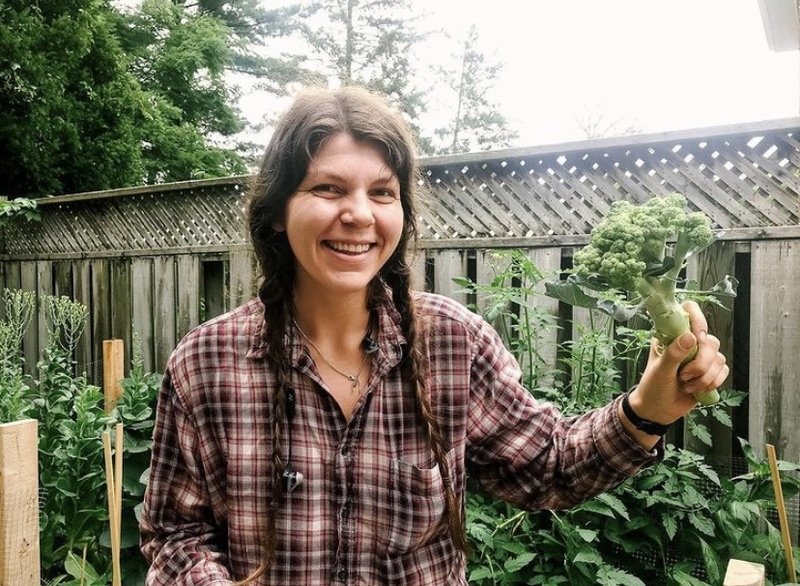 2020-08-06
2020-08-06Getting really excited that I'm actually growing edible food in the garden!
This post about a Canadian nutritionist reveals an individual's experience gardening this past summer during the pandemic. The caption includes how this person picked up gardening as a new hobby during lockdown and found how rewarding it was. This post will serve as a valuable story in how gardening became a popular activity for Canadians and offer one person's journey, including challenges, in starting a garden. -
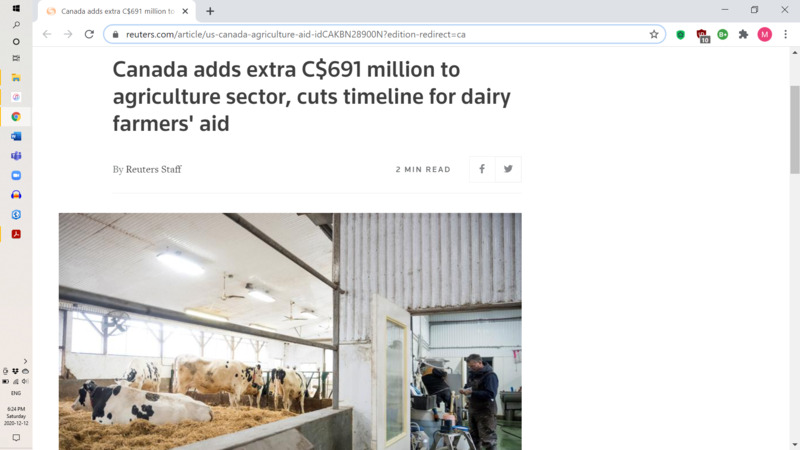 2020-11-28
2020-11-28Canada adds extra C$691 million to agriculture sector, cuts timeline for dairy farmers' aid
Article about funding for the agriculture industry -
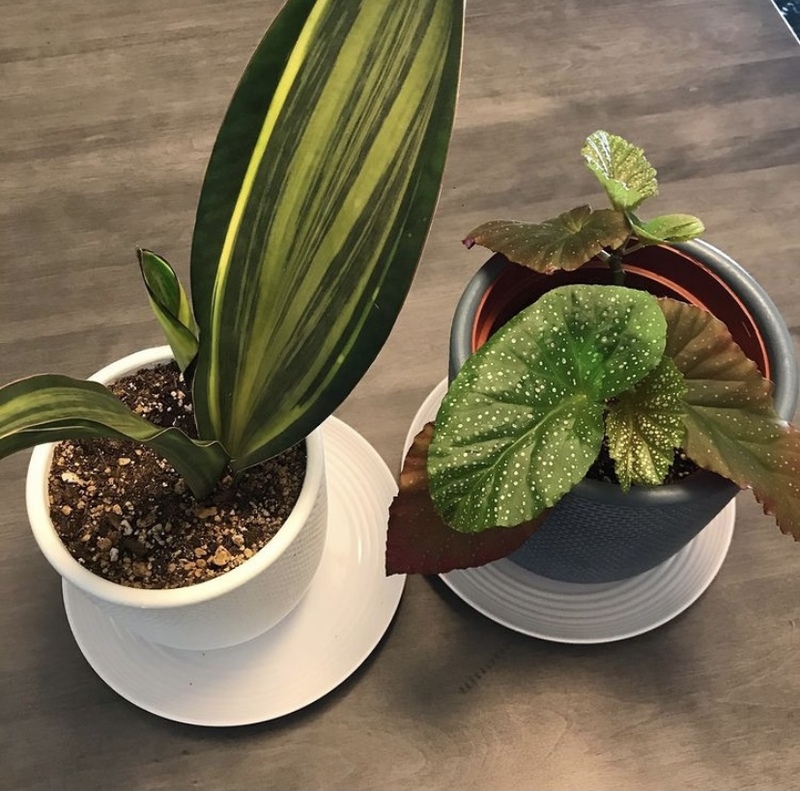 2020-11-25
2020-11-25New Covid restrictions announced today in Edmonton, Alberta, Canada
This photo includes two plants, and the caption describe the new restrictions enforced for Albertan residents. This post offers an individual view into how Canadians, particularly city dwellers, grew plants in the midst of COVID-19. -
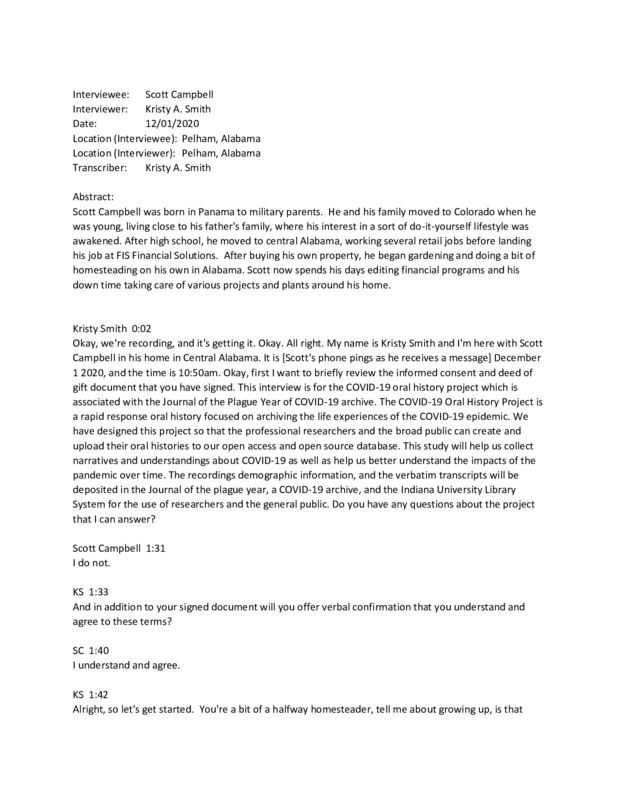 12/01/2020
12/01/2020Scott Campbell Oral History, 2020/12/01
Scott Campbell was born in Panama to military parents. He and his family moved to Colorado when he was young, living close to his father's family, where his interest in a sort of do-it-yourself lifestyle was awakened. After high school, he moved to central Alabama, working several retail jobs before landing his job at FIS Financial Solutions. After buying his own property, he began gardening and doing a bit of homesteading on his own in Alabama. Scott now spends his days editing financial programs and his down time taking care of various projects and plants around his home. -
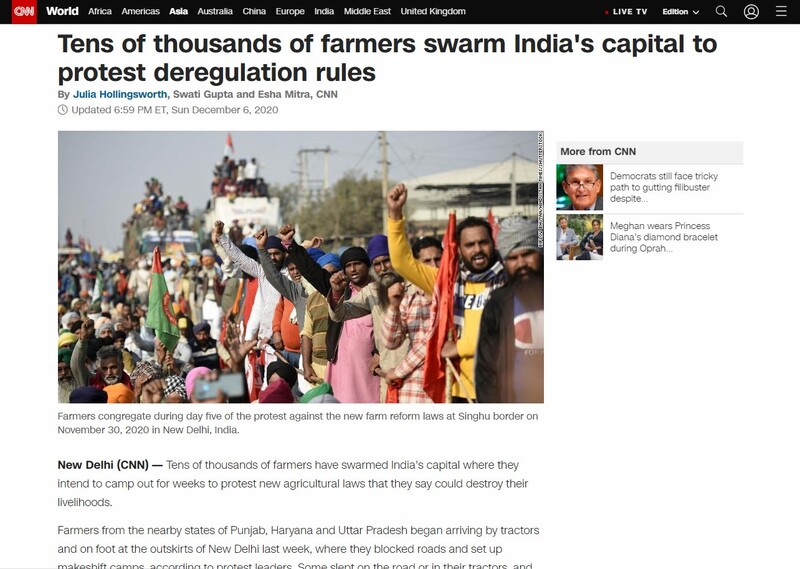 2020-11-30
2020-11-30Protest Amid the Pandemic
Protests are happening in Punjab, India amid the coronavirus pandemic. According to the Punjab government 3.330 farmers had committed suicide, from 2000-2019. Due to the high debt, 536 farmers took their lives in just 2019 alone. Will privatization of the farmer market increase or decrease the debt? The new farm bill which was passed on September 27 is stressing a lot of people, they are confused and are protesting. Earlier, the government bought directly from the farmers. The new bill makes the farmer market a free market making entry for private companies. Privatization is good for the development of the country, but what about the small farmers? They are worried, stressed and not aware about what’s going on. They need a Minimum Selling Price (MSP), which is already given to them by the government so why the protests? -
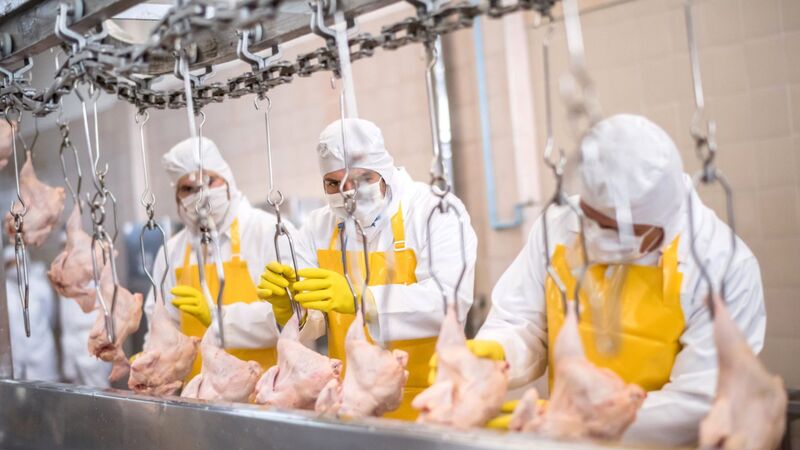 2020-11-21
2020-11-21Essential Jobs
This image represents essential businesses like meat packaging plants that fed america during the pandemic. Essential Jobs like these were hotspots during the pandemic but were critical to feeding americans. -
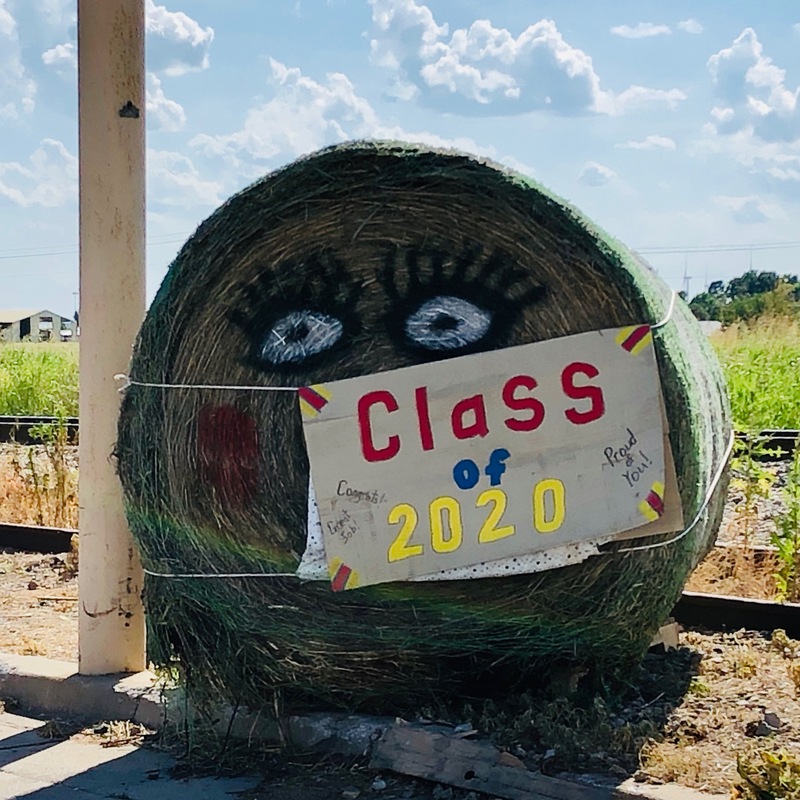 2020-06-16
2020-06-16Class of 2020 Celebrated by a Rural Community
The rural community of Tuttle, Oklahoma honored their class of 2020 high graduates with a sign made out of a round bale of hay. The round bale was located just off of State Highway 37 next to the Tuttle Grain & Supply. As part of the creativity, the bale had a sign saying: "Class of 2020" with comments such as "Proud of You!" and "Congrats!" as well as "Great Job!" The sign then covered the face of the hay bale in the design of a large face mask. The community was acknowledging the circumstances that altered the 2020 senior year and graduation to be a smaller event. -
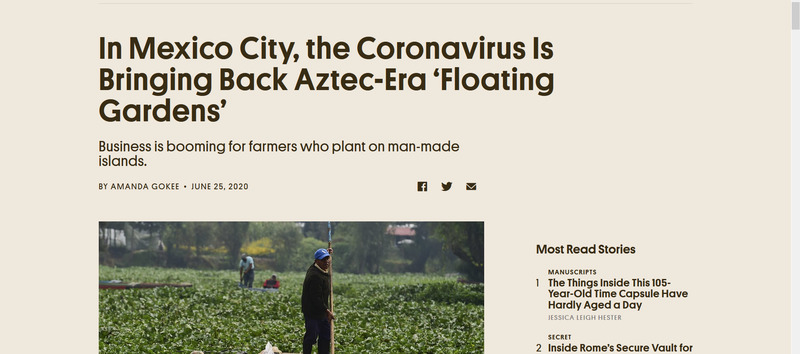 2020-06-25
2020-06-25“In Mexico City, the Coronavirus Is Bringing Back Aztec-Era ‘Floating Gardens’” - Atlas Obscura
In Mexico, the COVID-19 pandemic has seen the revitalization of an ancient, indigenous farming method: chinampas, or floating gardens. As described in Amanda Gokee's article for Atlas Obscura, this indigenous farming method had been in decline for several centuries, but the disruption of Mexico's food supply chain has created an opening for indigenous farmers to sell their produce on the market. According to Gokee, the chinampa system, which dates back to Pre-Columbian times, is one of the most productive agricultural systems in the world. So it is no surprise that it has seen a resurgence thanks to the pandemic. Gokee's article showcases the efforts of one agricultural collective Colectivo Ahuejote, to further develop the use of the chinampa system in the Valley of Mexico. -
2020-07-03T11:54
COVID-19 in My Small Suburban Town of West Chester, Pennsylvania
In my small suburban town of West Chester, Pennslyvania, the effects of COVID-19 were abundantly evident. People of all ages were impacted in significant ways. High school graduates were forced to stay home under Governor Wolfe's stay at home advisory during a time sacred to spending time with peers before college takes us our ways. The elderly worried about the safety of doing basic tasks like grocery shopping, most likely contemplating if this basic need will be an ill-made or possibly fatal decision. Another major event to be noted was the shortages of food and other necessities in the supply chain. This was a real wake-up call for many families in my town. Anxiety and panic definitely could be seen in everyday homes. I recall my one friend racing to Costco after hearing a small supply of toilet paper was in stock. He ended up spending a couple of thousand dollars, filling five carts to the brim with essentials. The sight of many bare shelves triggered this spontaneous decision to hoard. Many families acted similarly in my area, believing that the only option was to prepare to outlast a complete shutdown. While many businesses were forced to shut down, a local dairy farm called Bailey's Farm took advantage of the situation. It proposed a unique solution to the food shortage. Bailey's Farm began to increase its food output by collaborating with local farms across West Chester and Kennett Square. This agreement lessened competition among farms, allowing farms to focus on producing goods that they are most efficient at producing. Bernards Orchard grew a variety of fruits. Baileys Farm increased its milk and cheese production by adding more cows to their grassland. Northbrooke farms sold local pies, bread, pastries, and their famous apple cider donuts. Many other farms contributed to this network; however, these were the farms that I primarily worked with. These farms began to deliver goods to the doorstep of families. This solution relieved families from worrying about contracting COVID-19 in grocery stores, running out of food during a shortage, and simultaneously supported local farms. At the beginning of summer, I had hours of free time; I was advised to stay home and limit interactions with my friends. To utilize my time wisely, I began to look for work to have savings for college. Jobs were scarce because of the many closed businesses. I was beyond grateful when Bailey's Farm reached out and hired me as their new milkman to drive their refrigerated truck. Yes, I occupied the small niche of a milkman during a Global Pandemic. -
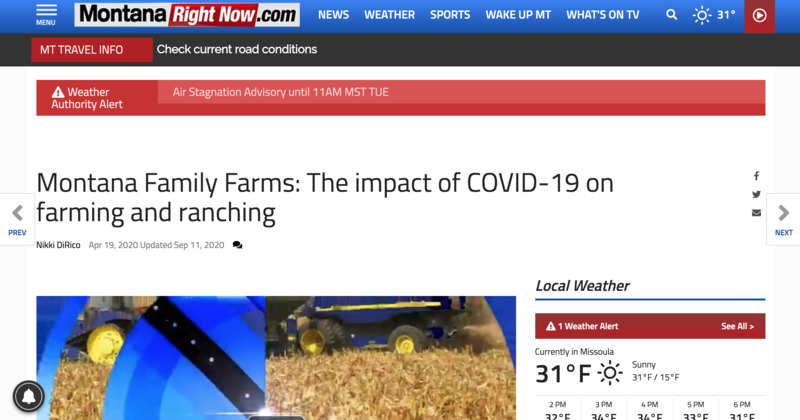 2020-11-06
2020-11-06Montana Family Farms
The impact of covid, supply and demand and the meatpackers in Montana. -
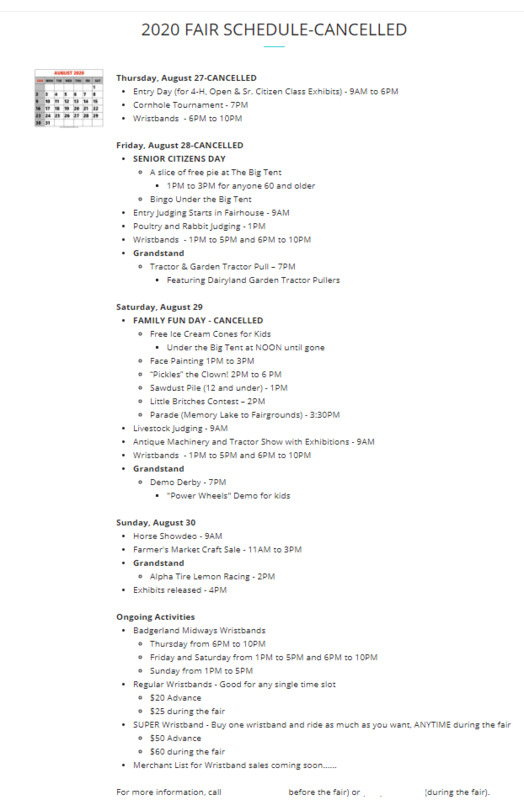 2020-08
2020-08143 Year Tradition Interrupted
The Grantsburg Fair was a big part of my life growing up and it happened every year in August. 2020 would have been the fair's 143rd year but was interrupted due to the pandemic. It was surprising to hear that something that was so expected from my childhood could be interrupted by COVID. -
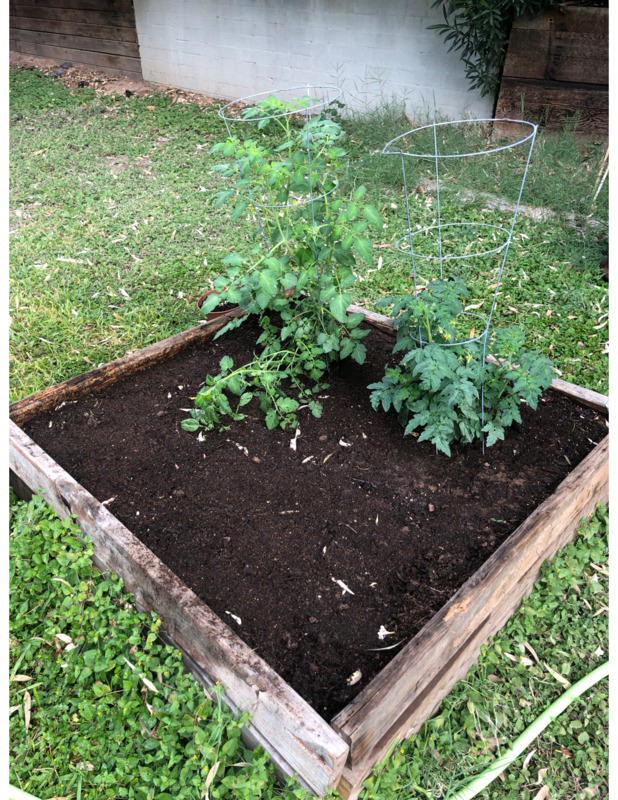 2020-11-06
2020-11-06Gardening During Quarantine
I, like most people, took up new hobbies to help pass the time. I built this raised garden from random pieces of wood laying around my backyard and even began to compost. I planted two tomato plants that have since grown very well and all of a sudden there were these plants growing from my compost. It's been nice having this small project to help pass the time. When I need a break from online school/work I come to my backyard and check up on it. It's essentially a source of calmness and relief in the world right now. -
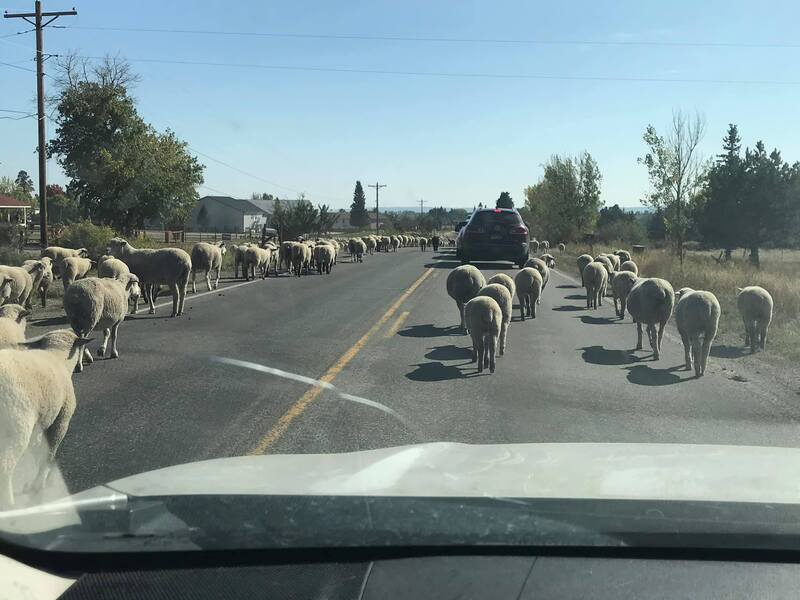 2020-09-25
2020-09-25Business as Usual
COVID has sent the planet for a loop. In general, we are all reeling from the changes and policies that have been implemented. However, in some areas where life moves a little slower, there are some things that continue on, business as usual. -
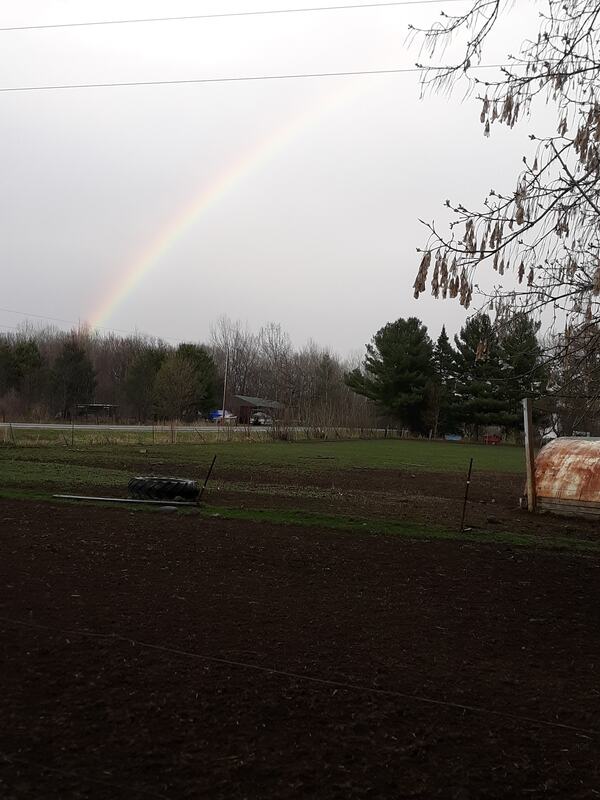 2020-07-20
2020-07-20Rural Rainbow
My aunt's photo of a rainbow on her dairy farm in rural Wisconsin. It shows how a lonely and quiet area in rural Wisconsin during the midst of a pandemic can have beautiful parts to it. -
0020-10-16
Revitalizing Cultural Gardening
When the stay at home order hit, I was in a tailspin wondering what to do at home. I couldn’t imagine working from home and teaching my children might last from March to September. Something amazing happened. For over ten years, I talked and dreamed of gardening. I recalled my grandmother gardening when I was a child. She taught all of her grandchildren her indigenous knowledge of growing food from the land. Working from home and homeschooling during the day, allowed us to take breaks and walk to our yard for gardening. The location of our garden in relation to home, work, and school was very convenient. Gardening allowed me to learn the different smells of dirt. The clay and muddy kind of dirt needed to be mixed with finer sand, manure and topsoil. The soil on my land was not sufficient for growing the plants I wanted. We worked early in the morning until the heat became too much to bear. Then we returned in the evening as the sun disappeared from the horizon. Our work included turning the soil, hauling in bags of manure and topsoil, and transporting finer dirt from areas around our home. Once the dirt and seeds were ready, the watering began. I never believed water smells different at different times of the day and months. In the morning, the cool crisp water smells light and pure. During the hotter times of the day, the water smells musky and not as refreshing. It led me to wake up early in the morning and come out late in the evening to water my plants. The smell of the damp earth will forever remind me of the journey of revitalizing cultural gardening techniques taught by my grandmother. -
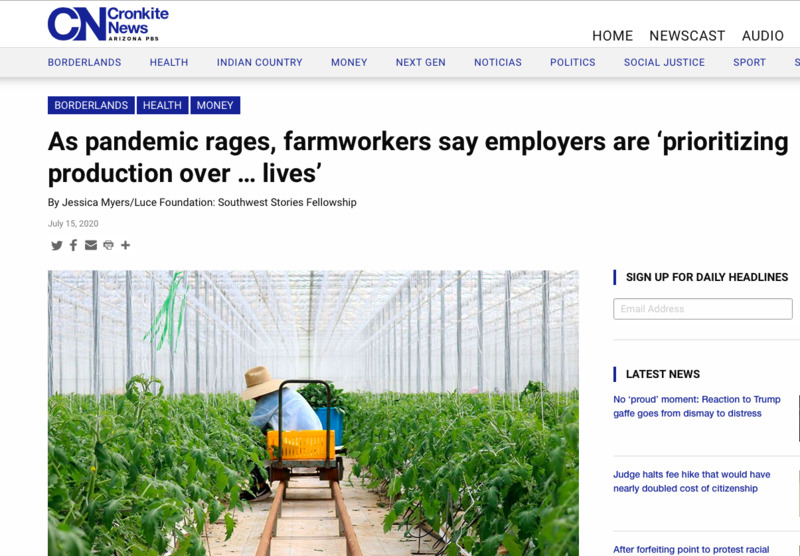 2020-07-15
2020-07-15As pandemic rages, farmworkers say employers are ‘prioritizing production over … lives’
As of early July, 87 workers and 58 family members, 23 of them children, had tested positive for the novel coronavirus that causes COVID-19, according to data compiled by United Farm Workers, a labor union. Many more are awaiting results. “I don’t want to go back,” Bertha said. She feels she has only two options: Accept the working conditions, or quit. The pandemic has forced agricultural workers throughout the Southwest to make a similar choice between their health and their incomes. Though industry representatives say farms are doing everything they can do to protect their employees, worker advocates argue a lack of industry protections – and the “invisibility” of much of the work done by day laborers – have made farmworkers especially vulnerable to exploitation. “It just shows the contradiction in calling somebody an ‘essential worker’ but only for what you need them for, not to care for them as human beings that also are afraid of getting sick,” said Juanita Valdez-Cox, a migrant-rights advocate in Texas. -
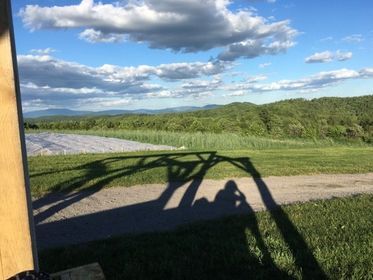 2020-09-24
2020-09-24Watching the Plants Grow
I spent the summer working on a farm and tending to a little garden with my mom at home (to be fair it was her garden...I just helped out a bit)! It was a privilege to get to escape into the outdoors and work until I was tired on things that I thought were meaningful. -
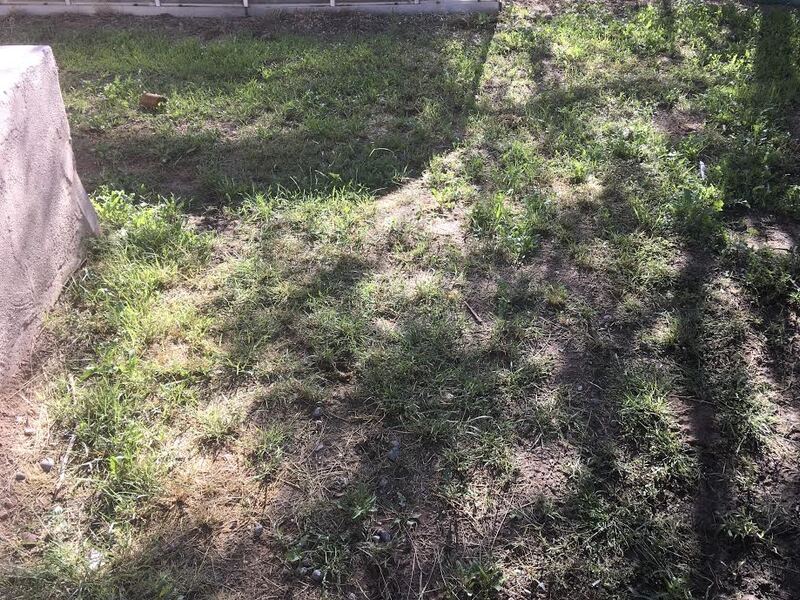 2020-07-27
2020-07-27My desert garden
Living in New Mexico, it can be hard to have grass or many plants due to the heat and dry ground. Between my dogs running around, the water needed, and the time it takes to have grass in the backyard we hadn’t grown any in a few years. When the quarantine had been happening for a while, my mom devised a plan of how to set up a sprinkler system to water they back yard and have grass and plants instead of dirt. The idea for a sprinkler system was one idea of many my family came up with. She ordered all of the parts online and researched ways to set up and successfully put a sprinkler system and dripline in. After receiving all the parts in the mail, my mom set off to home depot to get a ground trencher so we could put the piping underground. We had to lift and drop the trencher so the large dirt blade would create a path. She was supposed to get a small single-person trencher but came back with a giant and extremely heavy one. Since many people had the same idea of doing yard work during quarantine, the other trencher was being used by someone else. The trencher weighed so much and was so hard to move through the house into the backyard. We finished trenching by the end of the day and were ready to lay down piping. The hard part was getting the trencher lifted into the back of our car again, it was unbelievably heavy and it took all 4 of my family members to lift it into the car. We took some time and faced some more challenges when trying to grow a yard, but in the end, it ended up working out. Our yard now has a layer of grass and a drip line system to water other plants around the yard. -
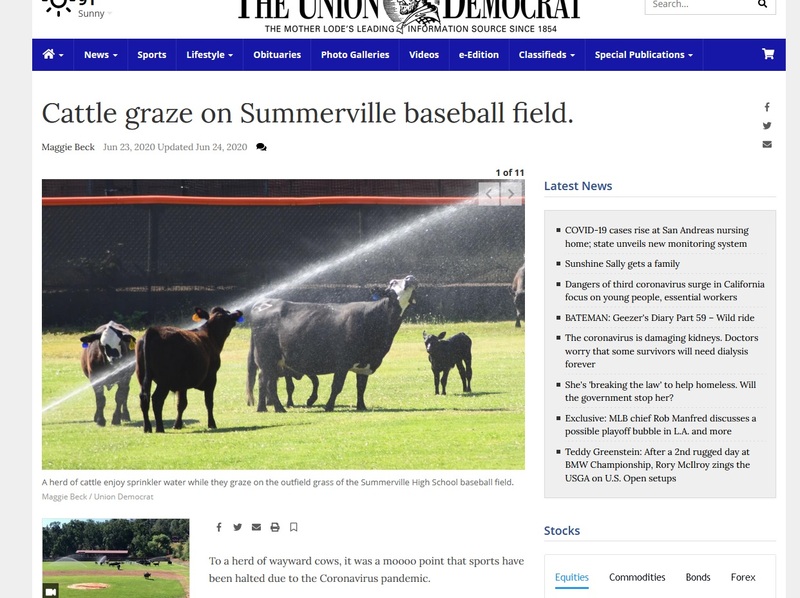 2020-06-23
2020-06-23Cows Graze on a High School's Baseball Field While Students Stay Away
While students continue to practice social distancing and campus won't fully reopen until October 5th, Summerville High in Tuolumne, California received some bovine visitors. In an article filled with puns, the author describes the situation and the corralling of the cows to the baseball field where they could be more easily retrieved and cool themselves with the sprinkler system while they waited. While the students are away, the cows will play! -
 2020-08-15
2020-08-15Cuando piensas tomar en la chacra durante la cuarentena
Este video fue grabado en día en la ciudad de Arequipa, como se sabe el consumo de bebidas alcohólicas esta prohibido ya sea lugares que estén fuera del hogar o dentro del mismo. Es por esto que algunos jóvenes optaron por celebrar el día de Arequipa en Characato distrito que se encuentra alejado de la ciudad el cual está rodeado de chacras los jóvenes pensaron que no serían atrapados pero al parecer algunas personas dieron aviso a los militares que se encontraban haciendo guardia a alrededores. El hecho ocasionó que al ser descubiertos empiezan a huir del lugar siendo perseguidos por el personal del ejército vecinos del lugar grabaron lo sucedido. -
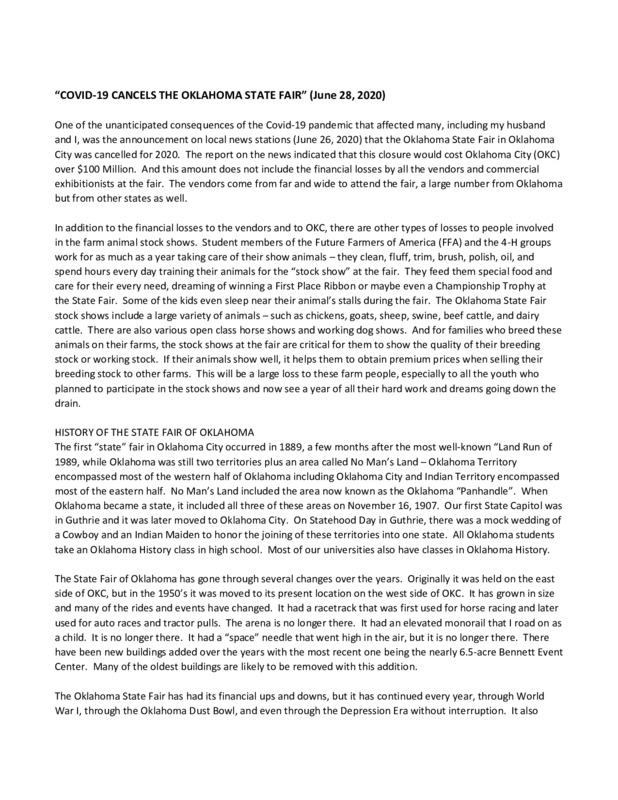 2020-06-28
2020-06-28COVID-19 Cancels the Oklahoma State Fair, Rural Attendee Tells Her Personal Story of Breaking Tradition.
Sharon Annesley of Blanchard, Oklahoma tells the story of how the COVID-19 pandemic has disrupted the traditions of the Oklahoma State Fair. Her text document story chronicles how the State Fair changed over the years, but had never been canceled. She details how this will affect the local economy of vendors, agriculture, and local tourism. She also describes what a typical day for her and her husband would be at the fair and the long-standing tradition it has become to them. Text document authored by Sharon Annesley. The story is titled under the heading “COVID-19 CANCELS THE OKLAHOMA STATE FAIR” (June 28, 2020) The story features personally gathered information and accounts by Sharon Annesley. This document was hand-submitted in a physical form for submission to Clinton P. Roberts for the #ruralvoices collection. Contributed by Clinton P. Roberts, curatorial intern for Arizona State University, HST 580. -
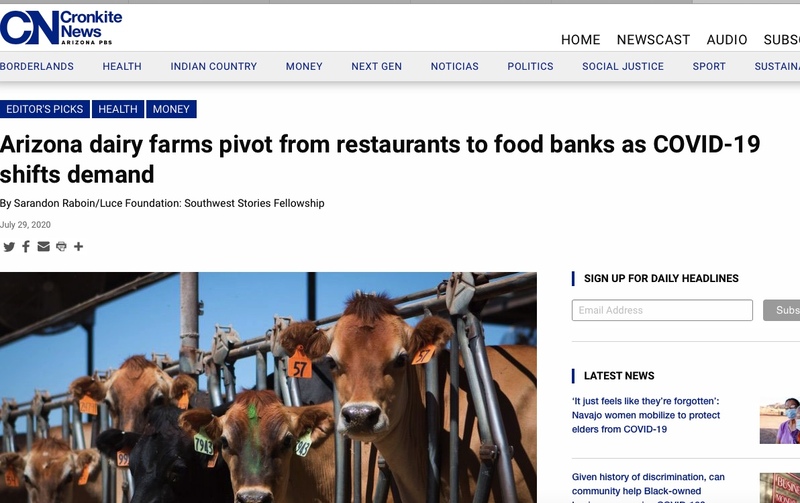 2020-07-29
2020-07-29Arizona dairy farms pivot from restaurants to food banks as COVID-19 shifts demand
By Sarandon Raboin/Luce Foundation: Southwest Stories Fellowship
